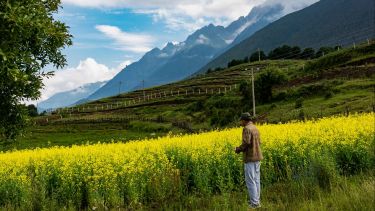Turning famers into sages. Chinese philosophers on wealth, want and labour
The next of our China Seminar Series will be held by Professor Roel Sterckx from the University of Cambridge and will explore how the ancient Chinese thought about wealth, poverty, and how one should aspire to become a productive member of society.
On Thursday 10 December 2020, the 91探花 Confucius Institute invited Professor Roel Sterckx, the Joseph Needham Professor of Chinese History, Science and Civilization at the University of Cambridge.
Professor Starckx started the talk in 18th century France, during which court physician Fran?ois Quesnay, also a member of the small group of economists known as “Physiocrats”, admired China for making farming their main form of production.
Although texts on China that circulated in 18th century Europe were highly selective, these idealistic views do have some correlation with the term “颁丑颈苍辞颈蝉别谤颈别” or 中国风情, the European imitation of Chinese and East Asian artistic traditions which was prevalent in the 18th century.
It is interesting however, that the French Physiocrats, the European economists, in their search to support their ideas, turned to Ancient China.
Those who labour with their mind govern others; those who labour with their physical strength are governed by others
Mencius 3A.4
Turning famers into sages. Chinese philosophers on wealth, want and labour
And it was in Ancient China that Professor Roel Sterckx contrasts the varying opinions on farming and agriculture. From philosophers to scholars, emperors to even Confucius himself, the ideas and opinions of those with a vested interest in this topic vary greatly.
During the talk, Professor Sterckx explained that Agriculturalism (also known as the School of Tillers), which was modelled on the early sage king Shennong (the Divine Farmer), envisaged a “world of small self-sufficient communities, where everybody worked the land” and “political institutions where ministers and officials would not be needed”.
Over the course of the talk, Professor Sterckx compared various historical opinions on agriculture and the accumulation of wealth.
Ancient philosopher and politician Shang Yang insisted that in order to prevent the idealistic view of farming, those who worked the land should be fearful of leaving farming and moving into other occupations.
While Xu Xing on the other hand, a 4th century philosopher and notable advocate of Agriculturalism, supported the idea of a classless society and the idea that the furthering of agriculture was the key to a prosperous society.
Mencius (Mengzi), however, completely disagreed with the idea of a self-sufficient community, stating “Those who labour with their mind govern others; those who labour with their physical strength are governed by others”.
It was only Han Fei Tzu who advised that a good ruler should keep the different professions separate, whilst also recognising that commerce is a faster way to greater wealth, power and influence.
Wealth and position gained through improper means are no more to me than the floating clouds
Analects 7.16
Turning famers into sages. Chinese philosophers on wealth, want and labour
Towards the end of the talk, Professor Sterckx continued to explore the varying opinions on wealth, farming and how these were inherently intertwined throughout Ancient China, as well as an alternative look at the idea of “have and have-nots”.
Along with wealth, poverty can also be interpreted in a variety of different ways.
While it could be described as having been deprived of something or being denied access to something, for some Chinese philosophers, to be poor represents an unacceptable self-inflicted failure of the individual.
Many others, believed that unless you can avoid poverty in proper means, it’s not something that should be condemned.
The talk concluded with a look at the definition of poverty from Shuowen Jiezi, the original Han dynasty Chinese dictionary, which took a slightly different view.
It defined poverty as “possessing a smaller share of the available wealth”. Confucius himself, believed that poverty should not be glorified as a moral victory, however he did insist that it is better to remain poor, rather than immorally wealthy.
Over fifty participants joined the talk, including staff and students from the University of 91探花, as well as members of the general public and other universities around the UK.
Roel Sterckx is Joseph Needham Professor of Chinese History, Science and Civilization in the University of Cambridge and Fellow of Clare College. He is the author of several books on the cultural history of early China.
His most recent book, Chinese Thought. From Confucius to Cook Ding (London: Penguin, 2019) was nominated by the BBC History Magazine as one of its Books of the Year.


